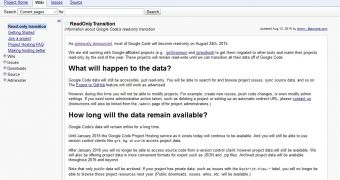Google Code, as initially announced back in March, will enter a read-only stage starting August 25. The initial scheduled date for the move was today, August 24, but the website is currently showing a site-wide banner saying the date is now August 25.
This means that starting tomorrow, project owners won't be able to modify projects in any way, be it via version control systems like Git, Subversion or Mercurial, or by submitting new issues or modifying administrative settings.
Project owners will still be able to download their data via Git, Subversion or Mercurial clients, though, and use Google Code's "Export to GitHub" feature.
Google Code is taking its last breaths
The first signs that Google was rethinking its strategy for Google Code were seen in May 2013 when the service announced it was disabling the ability for admins to offer downloadable packages for their projects.
As the service lost traction in favor of more modern services like GitHub, Google made the official announcement this March, when it disabled the possibility to create new projects and let everyone know that the service would effectively shut down in January 2016.
As an intermediary stage, the site is also entering a scheduled read-only phase, during which most of the projects will be archived, also serving as a last notice for developers to get their code out while they still can.
The Chromium and Android projects will continue to live on Google Code until the end of the year
After this read-only period, which ends January 2016, Google Code projects will be available as Web pages only, there won't be any version control access to the code, and private repositories will become inaccessible.
Developers that have managed to ignore Google Code for the past two, three years will still be able to get archived project data as JSON and ZIP files, even after 2016. It is unsure if this means the project files, or just a project's meta data.
The only projects that will continue to work under a read-write setting until the end of the year will be Google's Chromium and Android repos, but they are scheduled for relocation as well.
Besides the "Export to GitHub" button featured on every Google Code project, the service also offers tools for developers to relocate their source code to SourceForge, Bitbucket, and GitLab.

 14 DAY TRIAL //
14 DAY TRIAL //